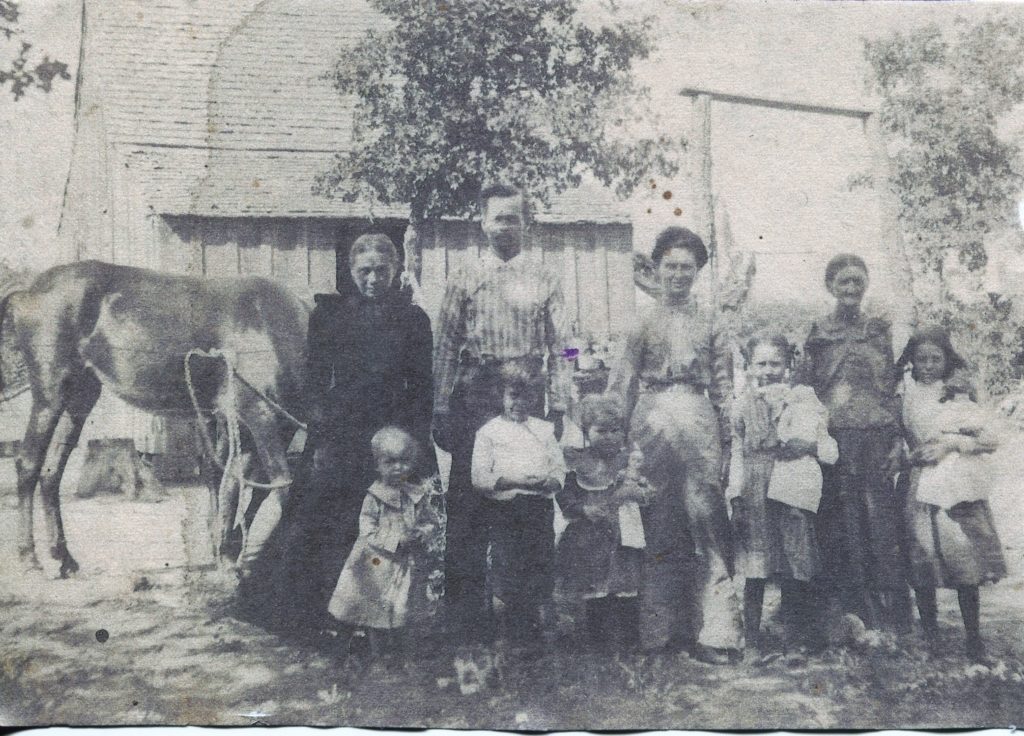Family stories. I think of them as the delicate threads that weave a family together. They can caution us from wrong actions, show us the constancy of love, or, by means of humorous anecdote, help us realize our ancestors weren’t always old. Perhaps there is even a story about a long-past relative that strikes a resonance in you, helping you feel a familial connection that transcends time. But in this age of electronics, it seems that more attention is paid to hand-held devices than individuals, and the old family stories are being forgotten, and then lost forever.

Mine is a family of storytellers, and I grew up immersed in the words of by-gone days. One I remember from childhood started, “Way back, when the family was still in Texas…” The story goes on to tell of how the summer had been long and scorching, and the family, along with various neighbors, had walked to a creek for refreshment. After cooling off in the water, there was the prospect of a hot walk back and only one giant tree between there and home. A neighbor boy declared that he would be first to sit in the shade and took off at a run. Upon reaching the tree, he dove under and landed on a rattlesnake. It bit him and he died.
Mercy, you are thinking, what an abrupt and tragic tale! You’re right, but it has become our own family version of “look before you leap”: a cautionary tale for impetuous youths. When I was old enough to ask what the boy’s name might have been, my elder relations all looked at each other. No one could remember. You see, this all took place when my people migrated from Kentucky to Texas, right after the Civil War. So this story has been passed through my family for more than 140 years.
What if your family’s stories don’t go much farther back than the teller’s own life span? Well, it is a fact that every person has an incredible tale to tell, even if they don’t think so. One of our tasks should be to make sure that our children are close enough to their grandparents and other elders to get to hear these kinds of stories and, in turn, pass them on.
How do you nurture those relationships? When my boys were small, we took off school every Friday to go visiting. We would go see one side or other of the grandparents and simply talk. I know it is sometimes awkward for both child and grandparent to find something to talk about. When an adult asks a child what they’ve been doing, the child is often struck dumb and can only shrug. On the way to go visit, I would ask each of the boys to think of something to tell their grandparents, and have them say what it was. Perhaps it was a new book they had read. Or they had learned to ride the bike. Or that they had done well in a sport.
When we arrived and hugged and settled down, I would begin to talk about some things that we had been doing as a family. After a bit I would say to one child, “And tell grandma and grandpa about the book you read.” They would not be paralyzed with shyness because they already knew what they were going to say. After a bit more talking, I would ask another boy to tell what new thing he had done. And so it went, and the grandparents were able to ask questions, give praise, and feel like they had discovered something new about their grandchildren.
As the boys grew they became more and more comfortable with talking in a group of adults, and now it is completely natural for them to converse easily with their elder relatives, or really any older person. Our church is filled with mainly older people, and my boys consider them extensions of our family.
What about the stories? When talking with the relatives, you can ask them questions that will engage your children. Perhaps you have a child who is interested in Little House on the Prairie. Encourage your grandmother to tell about how she used to milk the cows before school. You have boys who are interested in soldiers and battles? Have a veteran grandfather tell about his service. My boys can literally sit for hours and listen to my grandpa tell about his time in the Philippines and Japan during WW II, or my father about his tour in Vietnam.
Stories can provide morals, bridge generations, even help you to find your way in the world. Click To TweetWhat if your grandparents have passed on and you think your own parents are a bit dull? When you really begin to question people, even ones you have known intimately for years, you will find out things you never knew. Have your kids think of questions to ask. How did you and grandpa meet? Ask grandpa about his first car. What was their first job? Ask them both how they knew they were in love. Ask what is the oddest thing that has ever happened to them. Sometimes all it takes is the right question to show how interesting a person really is.
Now what if there are no grandparents or great-grandparents? What if they are very far away, or even estranged? It is sad, but it happens. I mentioned how much my boys enjoy the older folks at church. They have had some wonderful friendships with people who are so worthy of admiration and love. Perhaps there is a person, or couple, in your church or neighborhood who can fill that grandparenting void. The stories you hear from them may not be of your own kin, but once you hear them they are yours to cherish just the same.
Stories can provide morals, bridge generations, even help you to find your way in the world. And they show us that it is the people we love, and who love us, that truly make a family. I hope you spend this Grandparents Day with relatives or adopted kin, and that your time together weaves ever-closer bonds for you and your family.
